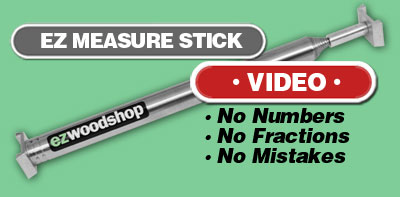Lumber Sizes / Dimensions
Nominal vs. Actual
| 1x Lumber | |
| Nominal Size | Actual Size |
| 1x4 | 3/4 x 3-1/2 |
| 1x6 | 3/4 x 5-1/2 |
| 1x8 | 3/4 x 7-1/4 |
| 1x10 | 3/4 x 9-1/4 |
| 1x12 | 3/4 x 11-1/4 |

| 2x Lumber | |
| Nominal Size | Actual Size |
| 2x4 | 1-1/2 x 3-1/2 |
| 2x6 | 1-1/2 x 5-1/2 |
| 2x8 | 1-1/2 x 7-1/4 |
| 2x10 | 1-1/2 x 9-1/4 |
| 2x12 | 1-1/2 x 11-1/4 |

EZ Corner Clamp

EZ Measure Stick

EZ Center Stick

EZ Match Bit Screw Guide
Updated June 29, 2020
1x Board Sizes
1x4 and 1x6 boards lose 1/4 inch in thickness and 1/2 inch in width before leaving the mill. That means a 1 x 4 board is actually 3/4 inches by 3 1/2 inches. The larger 1x boards (1x8, 1x10, etc.) lose 3/4 inch in width. That means a 1x10 is actually 3/4 inch in thickness by 9 1/4 inches.
2x Board Sizes
2x4 and 2x6 boards lose 1/2 inch in thickness and 1/2 inch in width before leaving the mill. That means a 2 x 4 board is actually 1-1/2 inches by 3-1/2 inches. The larger 2x boards (2x8, 2x10, etc.) lose 3/4 inch in width. That means a 2x10 is actually 1 1/2 inch in thickness by 9 1/4 inches.
See for Yourself
On your next trip to Home Depot or Lowes, take along a tape measure and head over to the dimensional lumber aisles. Measure the actual width and thickness of a pine board (like a 2x4) and then look at the sign above the rack. Hmm. Something doesn't quite match up.
If you can stop someone in the store to help explain the inconsistency, they'll start throwing around a few words like "nominal sizes" and "actual sizes" and "softwood lumber" and "hardwood lumber." Hopefully they will take the time to explain exactly what these words mean, which will go a long way towards making you feel more comfortable about buying wood.
For starters, you'll need to know that softwood (like pine, spruce, and fir) is measured and sold one way, and hardwood (like oak, maple, and cherry) is measured and sold in a totally different way. Don't get the two mixed up or you'll really be confused.